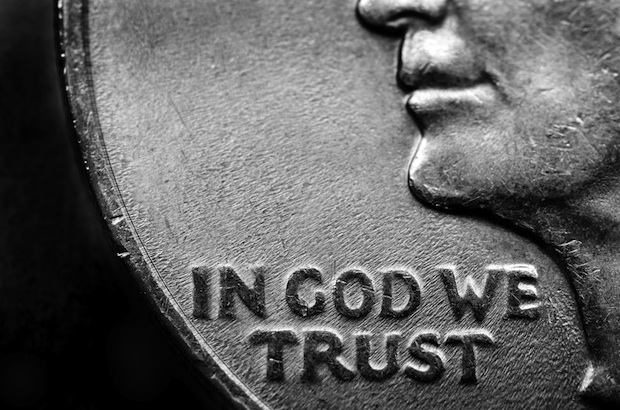Following months of effort culminating in hours of very heated debate, Washington state’s Pierce County Council voted to display the national motto “In God We Trust” in its chambers. And you know what? I think that’s fantastic. It’s fantastic, but it’s also incomplete.
Why shouldn’t a county council display our national motto, especially as we are overwhelmingly a nation of believers? It’s not as if it violates any church-state issues, to which we should always be attentive, as no one church is being touted over any other. And however often radical secularists or atheists claim otherwise, the constitution guarantees freedom of religion, including the freedom to have no religion, not freedom from religion in all areas of public life.
Of course, it’s that “freedom to have no religion” part that makes me say that the folks in Pierce county only got part of the job done. While they struck a blow for believers, they missed an opportunity to strike an equally powerful blow for the non-believers – one which in this case, would have been so easy to do. Not to mention every bit as important.
While true that Congress adopted “In God We Trust” as an official national motto in 1956 – no doubt as part of the ongoing “cold war” against the “godless communists – they did not do so at the expense of a far older motto, one dating back to 1782 and one which appears on the seal of our nation: E Pluribus Unum, Latin for, “Out of many, one”. Could one ask for a more powerful or beautiful sentence celebrating our national history and commitment to creating unity without demanding uniformity?
So yeah, let hang national mottos, but let’s hang them both side by side. Let’s recognize and celebrate the powerful role of faith in our history and our culture. And let’s also recognize that we are a great nation because we also recognize and celebrate our diversity, and the gift of non-belief right alongside belief. We need them all.
Most of our nation’s “we”, trusts in God, but not all, and we are at our very best when our acknowledgment of the majority view doesn’t crowd out the equally beautiful minority views. In fact, that ability may be what makes us great in all parts of life, but for now, I look forward to seeing it acknowledged in Pierce County, WA.

Listed for many years in Newsweek as one of America’s “50 Most Influential Rabbis” and recognized as one of our nation’s leading “Preachers and Teachers,” by Beliefnet.com, Rabbi Brad Hirschfield serves as the President of Clal–The National Jewish Center for Learning and Leadership, a training institute, think tank, and resource center nurturing religious and intellectual pluralism within the Jewish community, and the wider world, preparing people to meet the biggest challenges we face in our increasingly polarized world.
An ordained Orthodox rabbi who studied for his PhD and taught at The Jewish Theological Seminary, he has also taught the University of Pennsylvania, where he directs an ongoing seminar, and American Jewish University. Rabbi Brad regularly teaches and consults for the US Army and United States Department of Defense, religious organizations — Jewish and Christian — including United Seminary (Methodist), Yeshivat Chovevei Torah (Modern Orthodox) Luther Seminary (Lutheran), and The Jewish Theological Seminary (Conservative) — civic organizations including No Labels, Odyssey Impact, and The Aspen Institute, numerous Jewish Federations, and a variety of communal and family foundations.
Hirschfield is the author and editor of numerous books, including You Don’t Have To Be Wrong For Me To Be Right: Finding Faith Without Fanaticism, writes a column for Religion News Service, and appears regularly on TV and radio in outlets ranging from The Washington Post to Fox News Channel. He is also the founder of the Stand and See Fellowship, which brings hundreds of Christian religious leaders to Israel, preparing them to address the increasing polarization around Middle East issues — and really all currently polarizing issues at home and abroad — with six words, “It’s more complicated than we know.”

